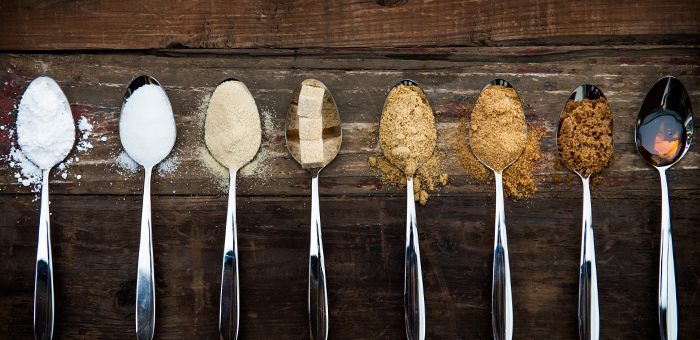Break the Sugar Habit

The recently introduced sugar tax on soft drinks has highlighted the many health problems associated with excess sugar intake. Here are 5 good reasons to reduce or give up sugar:
- sugar provides empty calories
- sugar upsets blood sugar levels
- sugar is associated with weight gain and obesity
- sugar is implicated in insulin resistance, type 2 diabetes and cardiovascular disease
- sugar rots the teeth
Unfortunately sugar is replaced in many foods with artificial sweeteners, also known as low calorie sweeteners. However, as highlighted in the post Artificial Sweeteners – Not a Healthy Substitute, these may be just as damaging to health as sugar. But why are so addicted to sweet foods? It may be down to our ancient ancestors…
Evolutionary Tastes
We are naturally drawn to sweet tasting foods for evolutionary reasons; sweet foods are generally safe to eat and provide calories that would have been most welcome to our ancestors. However, the danger lies in the fact that we can access huge amounts of sugary foods without expending any calories. This leads to the many health problems associated with excess sugar and obesity.
Changing Tastes
The good news is that this cycle can be broken. Cutting out sugar for a few weeks can re-sensitise the taste buds meaning sweet foods taste too sweet. After a while without sugar you will start to appreciate the other tastes and flavours in food and eating will become increasingly pleasurable.
To begin with cutting out sugar can lead to feelings of lethargy, irritability and tiredness. However, this rarely lasts more than a week, after which energy, mood stability and mental clarity increase.
In the long run the occasional sweet treat is fine as part of a healthy diet and life-style. However, initially at least, many people struggle to stick to occasional treats. One can lead to many and that’s a rocky road back to sugar addiction. If sugar has this effect on you then it is best to cut it out completely for a period of time.
Here are some steps you can take to reduce your need for sweetness:
- Assess what you are eating – go through your kitchen cupboards and fridge and identify all the foods you currently eat that contain sugar. Whilst you may not want to throw everything away immediately you will know not to buy those foods in the future.
- Read labels before buying – when you go shopping read the ingredients label before you put it in your shopping cart. Soon you will get to know what is in what and it will be less time consuming.
- Beware of diet foods and low fat foods – these often contain artificial sweeteners and additives which carry their own risks to health. Artificial sweeteners have no part in a healthy lifestyle and have been shown to contribute to weight gain. See post on Artificial Sweeteners – not a healthy substitute.
- Restock your kitchen – from now on buy whole natural foods. Cook and prepare your food from scratch.
- Sugars that are allowed – many whole foods contain natural sugars. Fruits, root vegetables and grains all have a natural sweetness. The sugars found in whole foods are balanced with fibre and nutrients meaning their effect on the body is very different from added refined sugars. However, it’s advisable not to have too many sweet foods such as fruit due to their fructose content.
- Identify treats to enjoy in moderation – of course you don’t want to feel deprived. Identify whole foods that you regard as a treat and have these in stock so that if you get caught out by a major sugar craving you have something to satisfy your taste buds. Delicious, natural sweet treats include fresh pineapple, mangoes, dates, apricots and figs. Make a creamy smoothie by blending any of your favourite soft fruits with an avocado or some coconut milk. Root vegetables are also sources of sweetness.
- Have healthy snacks to hand – making sure you have something healthy to hand when hunger strikes is one of the keys to success. Nuts, seeds, olives, avocados, fruit and fruit and nut bars from the health food shop are all worth having in stock.
- Plan! – until healthy eating becomes a habit it is best to plan your meals and snacks in advance.
- Support blood sugar control – sugar cravings are often caused by highs and lows of blood sugar. Avoiding sugar and refined carbohydrates is one of the best ways of reducing these ups and downs. In addition include protein and fibre with your meals as this slows down the release of sugars from carbohydrates.
- Stay well hydrated – sugar cravings can be caused by thirst. Drink something and see how you feel. Good ways to hydrate other than water are vegetable juices, herbal teas, fruit teas, lemon water, ginger tea and dandelion coffee.
- Supplemental help – chromium, zinc, magnesium, B vitamins and vitamin D can all help to balance blood sugar levels.
- Herbal help – cinnamon, fenugreek, bitter melon, gymnema sylvestre, silajit, ginger and turmeric may all help with blood sugar control.
- If you crave sugar find an alternative activity – go for a walk, phone a friend, weed the garden, do a crossword, read a book, watch a film, do the washing up, clean the bathroom, sort your clothes, do some yoga … there are lots of things you can do to distract yourself from dwelling on comfort foods.
- Remember that cravings will pass!